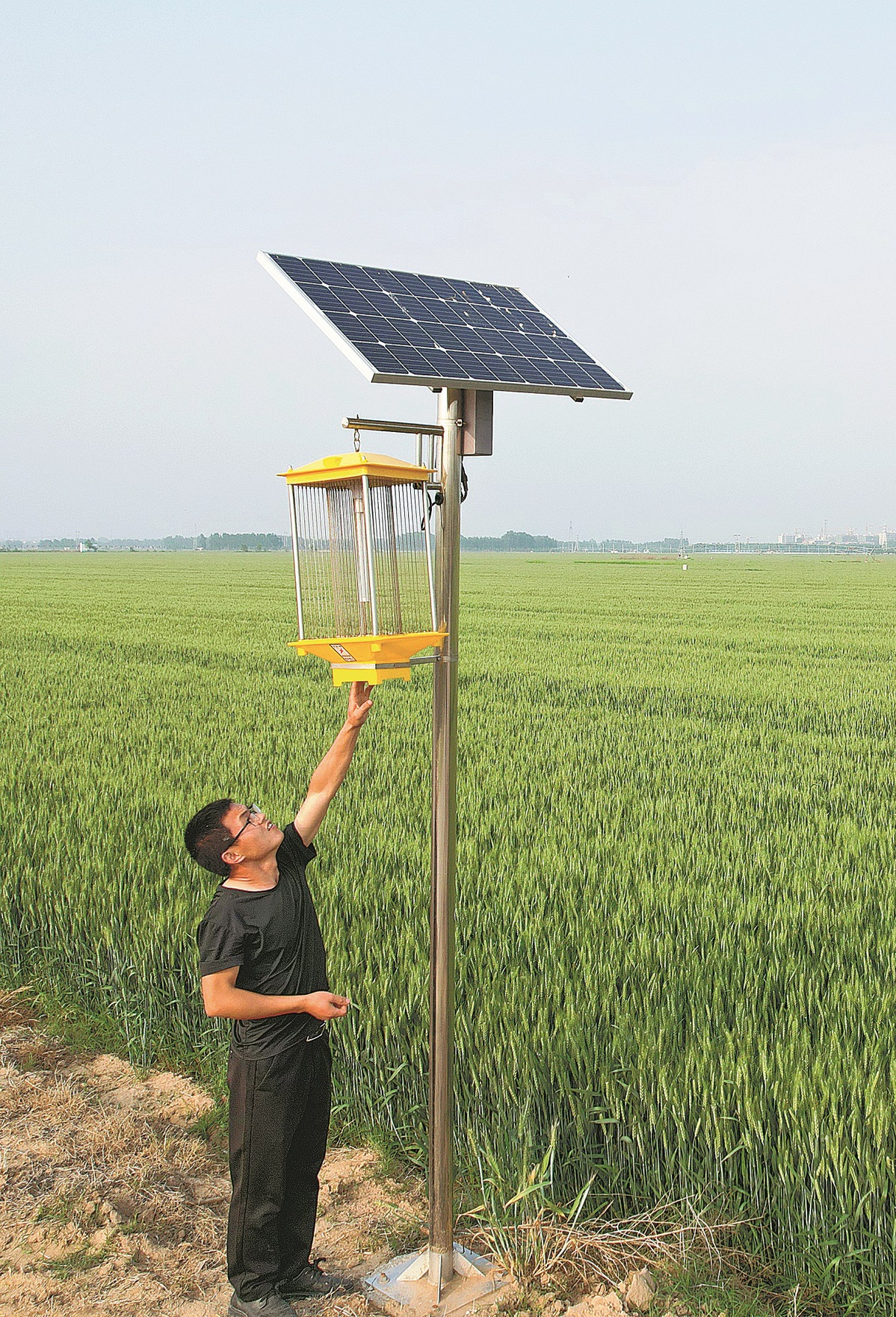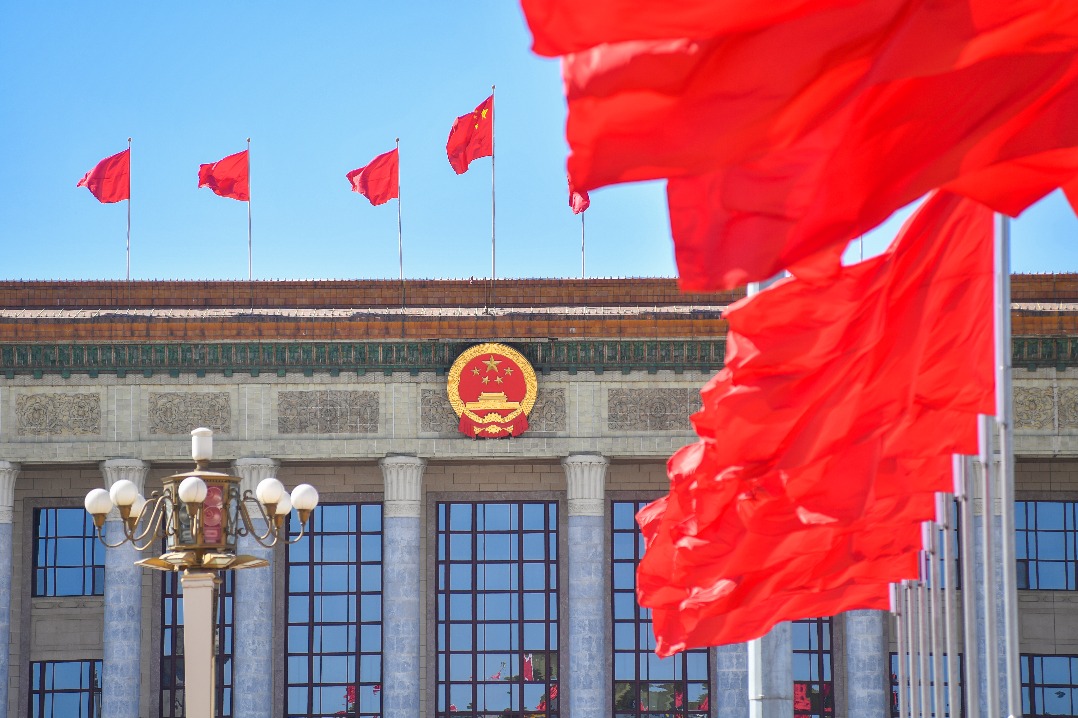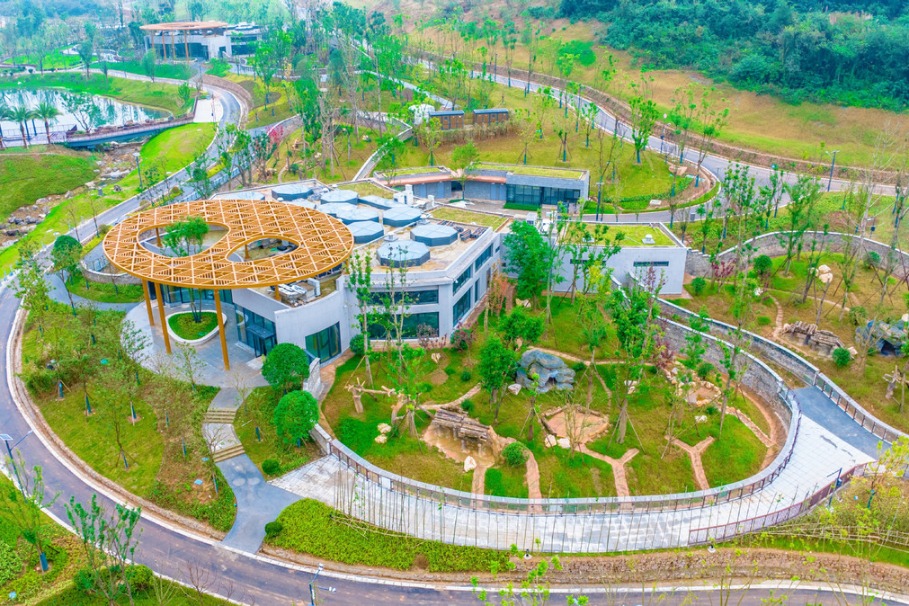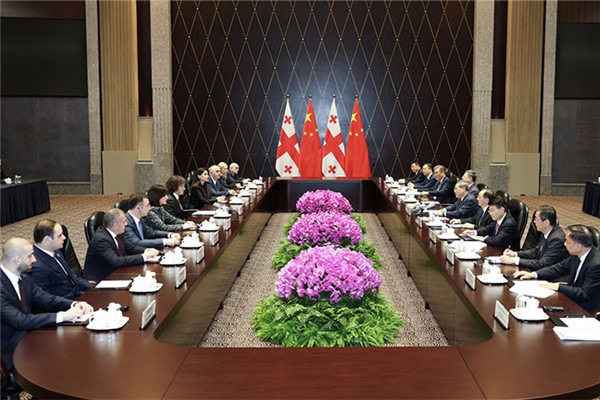Bright ideas vitalize rural agriculture


Spread among the vast fields of wheat that span Pingyuan county in Shandong province are 182 solar-powered smart pest killers, zapping away to protect the crops and put more money in farmers' pockets.
Standing like modern scarecrows, with a slanted solar panel for a hat, the pest killers were installed by a young man from the city who decided to come to the countryside to help revolutionize and vitalize the agricultural industry.
He Shibao graduated with a master's degree in insectology from Chongqing's Southwest University in 2018, and quickly secured a position at Pingyuan Luwang Agricultural Development Company in rural Shandong, China's second biggest producer of wheat after Henan province.
From the moment that He started his new job, he began to make an impact.
"By using internet of things technology and analyzing the frequency of zaps from the pest killers, we can then determine how much pesticide needs to be used on the crops," said He, who added that by using the solar-powered pest killers, Pingyuan Luwang has vastly cut the amount of pesticide it uses.
"We can cut pesticide use by 20 percent by spraying it when the eggs are hatching," he said.
Pingyuan Luwang has partnered with local farming cooperatives led by local committees of the Communist Party of China, and is passing on a vast array of modern farming techniques from the solar-powered pest killers to smart irrigation and more scientific plowing.
"There are various types of pests that harm crops and result in loss of productivity each year. If pesticides are used in large quantity, they will cause adverse impacts on people, animals and the environment.
"So, the solar-powered pest killers are eco-friendly, reduce the pest population and minimize the use of harmful chemical pesticides," he said.
His sole focus in Pingyuan has been to find modern solutions to solve age-old farming problems, to increase grain yield and take better care of the farmland.
When he first began imparting his knowledge, many traditional farmers were skeptical of his newfangled ideas.
"He may indeed have a 'master's degree' from a university, but just how well can he grow wheat in our village?" asked Zhao Jianping, the Party branch secretary of the village of Wujiazhuang.
When Pingyuan Luwang took over the running of 330 hectares of farmland in Wujiazhuang in 2018, the company selected five varieties of wheat to plant based on the soil conditions.
"They planted the wheat days later than we used to do it before, and they planted fewer seeds, so I thought the yield would be reduced," said Zhao.
But to Zhao's surprise, the average yield per hectare was 1.5 metric tons higher than previously.
With the success of He and Pingyuan Luwang has come an increased demand for young and talented people to come to manage the farmland, and He's wife, Xu Xing, a graduate from Shanxi Agricultural University, is among five new graduates hired by the company.
The couple now work together scientifically plowing the farmland and ensuring a rich wheat harvest each year.
"Farmers here didn't deep plow the soil before because it cost too much," said Xu.
"Deep plows enable crop roots to reach deep and stand firm, and it reduces fertilizer use," she said, adding a healthy soil system will be formed if deep plows are conducted every year.
Another innovation introduced by He has been giving up the traditional irrigation system that uses pipes, and instead using automatic irrigation facilities installed in the fields as well as irrigation machines that save water and labor cost while achieving better irrigation.
With the help of a data sharing cloud platform developed by the county government, He and other farmers are able to decide when it's best to water crops and how much water they need.
Data on the condition of crops, soil, pests, temperature, humidity and wind are collected and transmitted to the cloud platform through sensors installed in the fields.
To become more sustainable, in 2020 Pingyuan Luwang started running a pig breeding facility and processes dung into organic fertilizer that can be used to improve soil and crop yields.
"The organic fertilizer can replace expensive chemical fertilizers, improve soil fertility, increase productivity and reduce vulnerability to droughts and climate hazards," said He.
The hundreds of hectares of wheat He manages are being harvested. Besides harvesting the wheat, he will select new seeds for cultivation.
"This year we will choose wheat seeds to grow according to the crops' use, such as wheat for producing ordinary flour, refined flour and for seed cultivation, to explore a way to reach a higher yield," said He.
- China, Serbia vow to deepen military ties
- China records 10-year low in first marriages
- Experts promote raising awareness to boost HPV vaccination
- Haikou intl airport launches new 24-hour direct transit policy
- China-Laos international passenger line launched
- Beijing receives climate award at COP30 Local Leaders Forum




































